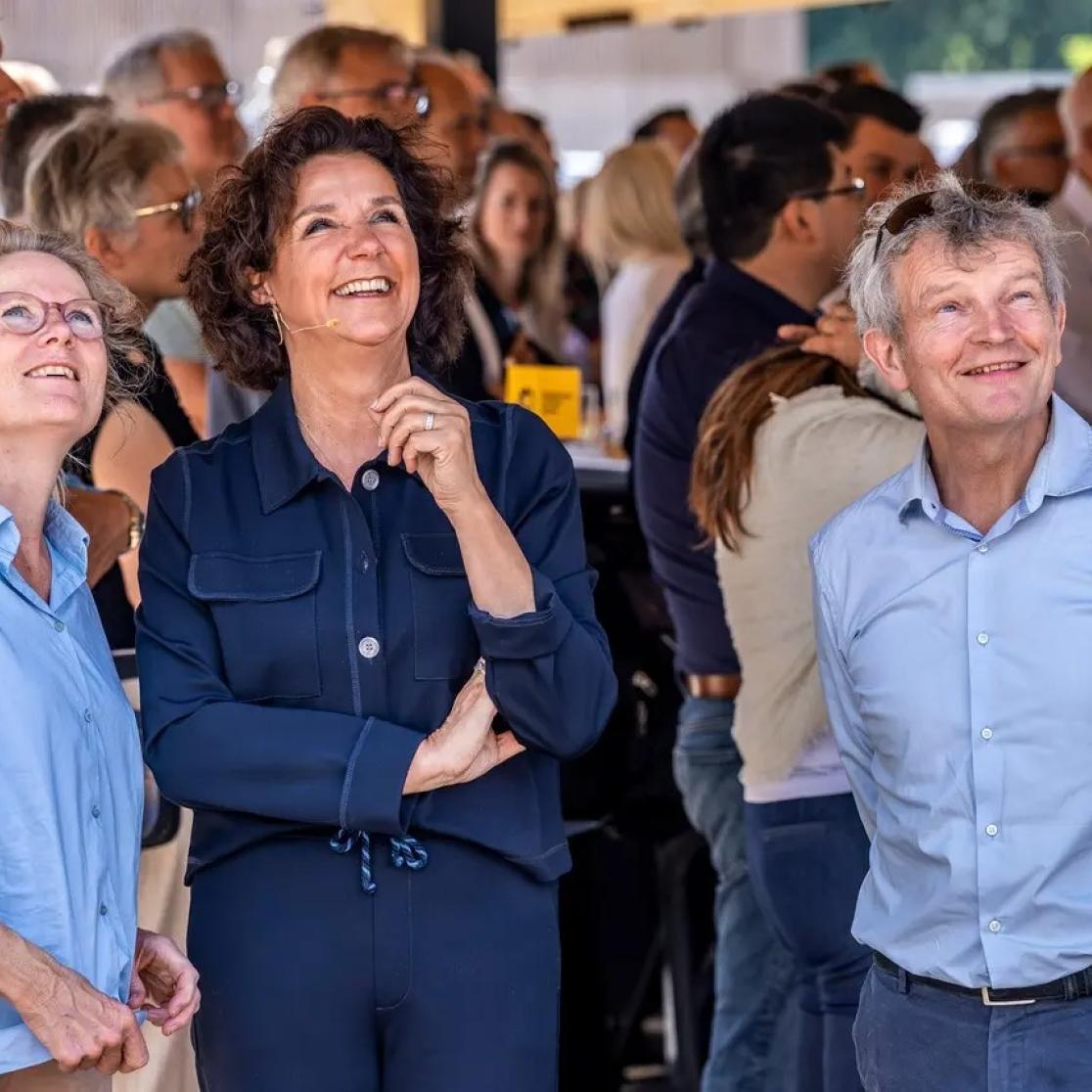“We’re onto something good”
The preparations took around five years, but last month, the time had finally come: the official kickoff for the construction of Brightlands Circular Space. Rising up at the edge of the Brightlands Chemelot Campus, under the shadow of the 100-year-old Iterson cooling tower, the first demonstration facility will be built, a co-creation center designed to bring out the best in plastics. Circular, sustainable and CO2-emission free
The pride is clearly visible on her face on this sunny afternoon under a hip tent canvas, at the edge of the construction site where the first contours of Brightlands Circular Space are taking shape. “This may rightfully be called a milestone,” says Lia Voermans, Chairman of the Steering Committee for Brightlands Circular Space, the alliance between research institute TNO, Maastricht University and Brightlands Chemelot Campus, the three founding fathers of the ambitious project. “We have overcome many obstacles, but also setbacks, complications with permits. A failed government policy that has left recyclers in a jam, with some of them even going bankrupt. And now here we all are in spite of these hurdles. Construction has begun, and in just under two years a unique demonstration plant will be operational here, proving that it is possible to make new, valuable raw materials from plastic waste. This is a game-changer for the Netherlands, Europe and the world. And it was made possible by many parties, all of whom had the courage and patience to persevere.”
Courageous
Lia Voermans is at a loss for superlatives, but anyone delving into the birth of Brightlands Circular Space will realize that she’s not exaggerating. The funding for the total complex, 60 million euros, is not a given in these times. The founders are committing to 25 million euros, the National Growth Fund is contributing 25 million, and the European Just Transition fund will account for five million. The remaining financing is coming from the partners. This is nothing short of courageous considering the market for plastic from waste is downright bad; plastic from oil is still cheaper. Development on production techniques hasn’t been completed yet, the supply of feedstock isn’t guaranteed, and permits are being delayed. Plenty of reasons to start questioning the feasibility of the project, but the three founding partners continue to push forward, backed by the support of many stakeholders. “We’re not going to sit here and wait for change; we’re initiating it ourselves,” says moderator and spokesman Maurice Olivers. “We have to make the shift toward circularity, with hope as the engine driving us and imagination as our fuel.”
University
Thomas Cleij, dean of the Faculty of Science and Engineering at Maastricht University, is eager to confirm the previous speakers’ comments. He outlines how the university got involved with the campus-in-the-making 15 years ago, with no plans to ever leave. “Going against the grain, we have assumed a position here on campus. 2017 was the first time I heard the word ‘circularity’. This was something else we wanted to be involved in, to play a role in the transition. And now we’re a proud partner of Brightlands Circular Space that covers the entire value chain, from the collection of used plastic to new raw materials. A center of innovation and research that is befitting of an ambitious university.”

We’re onto something good
The official start of construction coincides with even more good news. This also happened to be the day that the French company Reju announced it will build a textile recycling plant at Chemelot. This investment of 300 million euros will help ensure the processing of 50 million kilos of discarded clothing. For Astrid Boeijen, CEO of Brightlands Chemelot Campus, it’s also a sign that the tide is turning. “We’re now seeing more opportunities than threats. European regulations are tightening up, CO2 emissions have to be reduced, used plastic is rising in value and pressure is increasing on the plastic value chain to be more sustainable and circular. It all comes together at Brightlands Circular Space: research, talent development, top facilities, a foundation for new technologies, new forms of cooperation and business models. The start of construction is a milestone; a special moment to stop and reflect. As Lia Voermans put it: We’re onto something good.”
Impression
This happens during an official moment at the construction site where builders and engineers continue to work undisturbed on the first frame for one of the industrial halls. Partners, designers, the contractor and other parties involved collectively unveil a construction sign with a first impression of the complex that will total over 41,000 square feet. “The world is watching along with us,” Lia Voermans says. “There is an awful lot of interest, both from the commercial and scientific arenas. In just under two years, we will know more, and that time can’t come soon enough for me.”
Here you can read more about the construction process. For further information about Brightlands Circular Space: check the website.
Source: Brightlands news
“We’re a proud partner of Brightlands Circular Space that covers the entire value chain, from the collection of used plastic to new raw materials. A center of innovation and research that is befitting of an ambitious university.”
Thomas Cleij, dean of the Faculty of Science and Engineering at Maastricht UniversityAlso read
-
Andrés Caceres Solari on No room for Human Rights in Gaza and Ukraine: How the Law Legitimizes Urban Devastation
Pick Our Brains Session with Andres Caceres Solari

-
AMIBM hosts the final Realise-Bio conference
The Aachen Maastricht Institute of Biobased Materials (AMIBM) hosted last week the third and final Realise-Bio annual conference, bringing together the Dutch and German bioeconomy ecosystems at the Brightlands Chemelot Campus.

-
Macrophages as key to treating liver fibrosis
Sabine Daemen is researching how certain macrophages can slow down fatty liver disease and fibrosis in order to develop new therapies.
